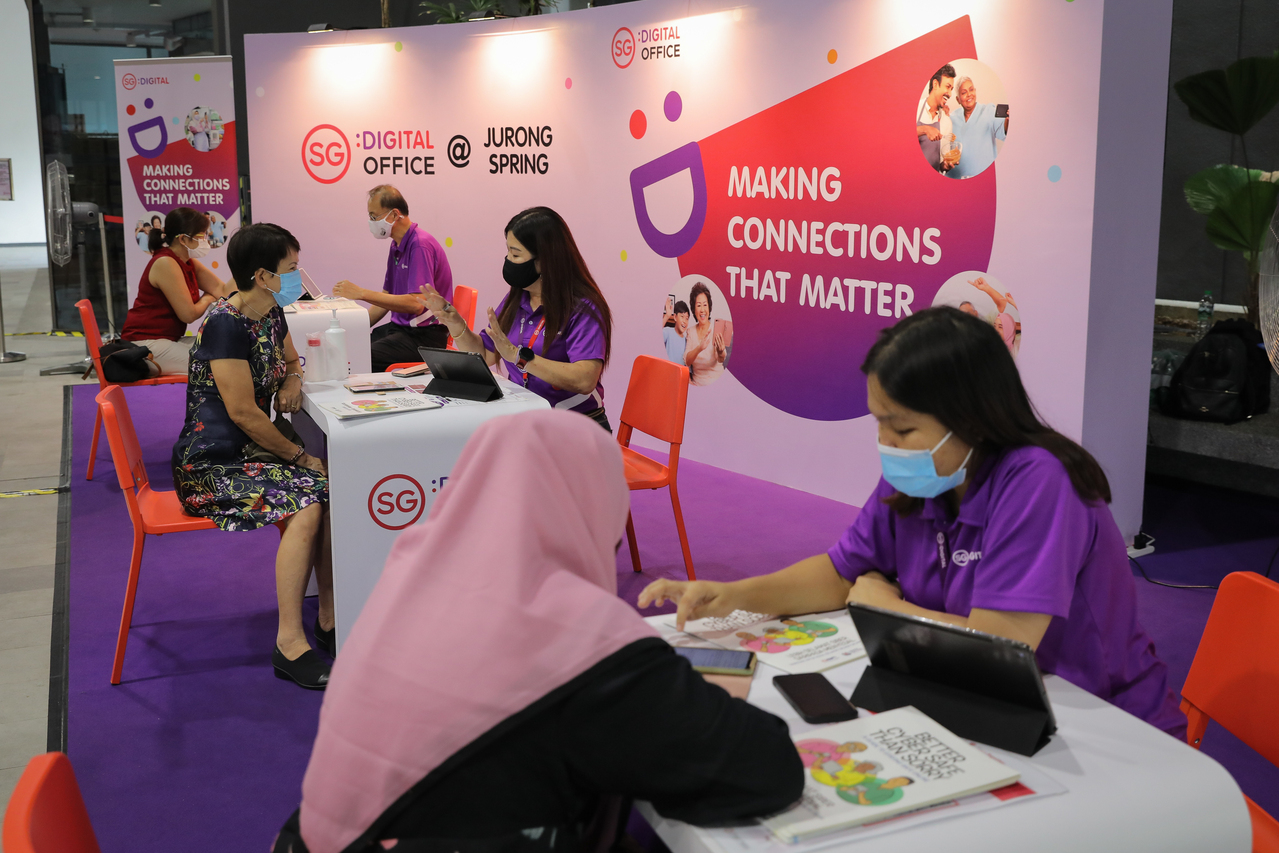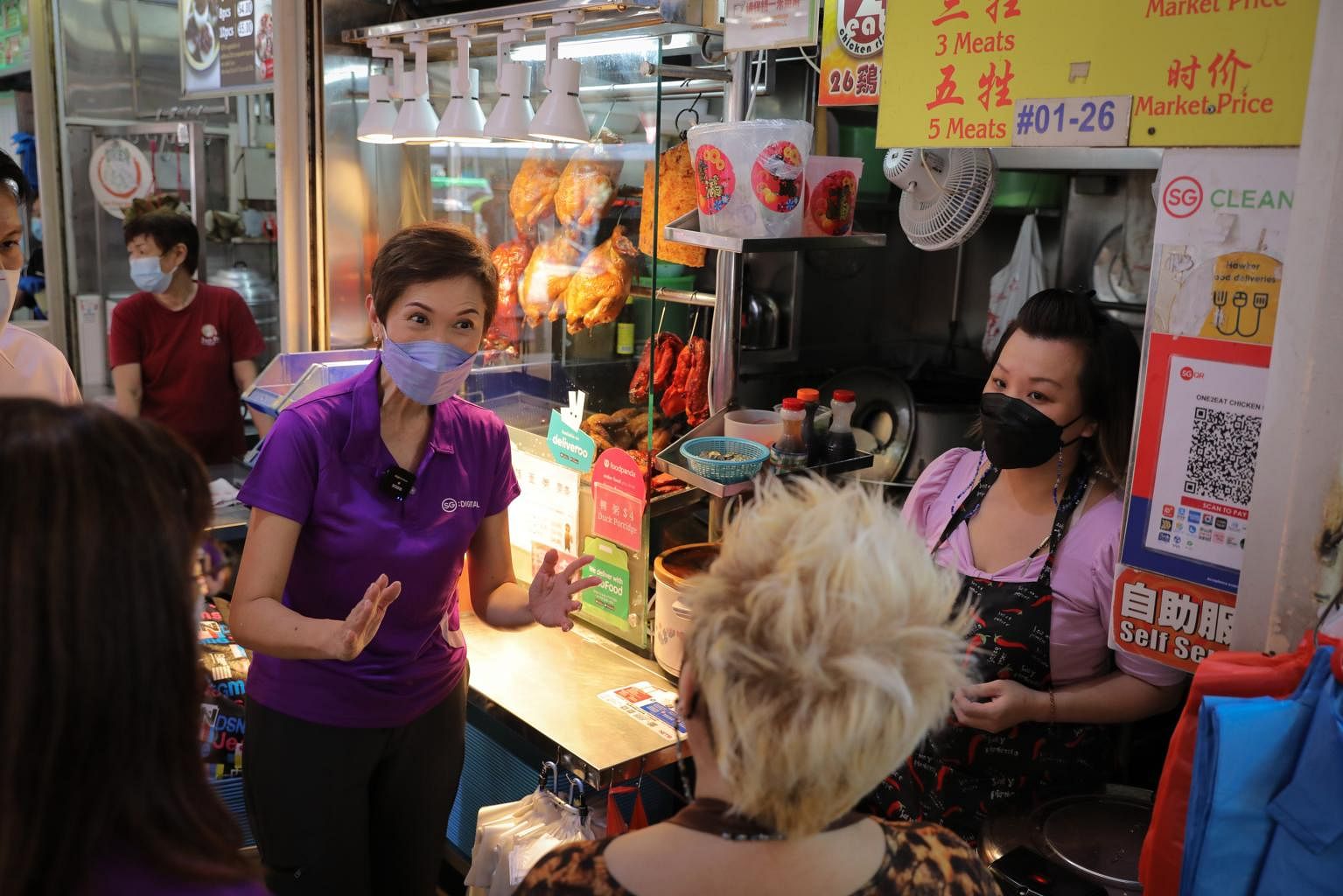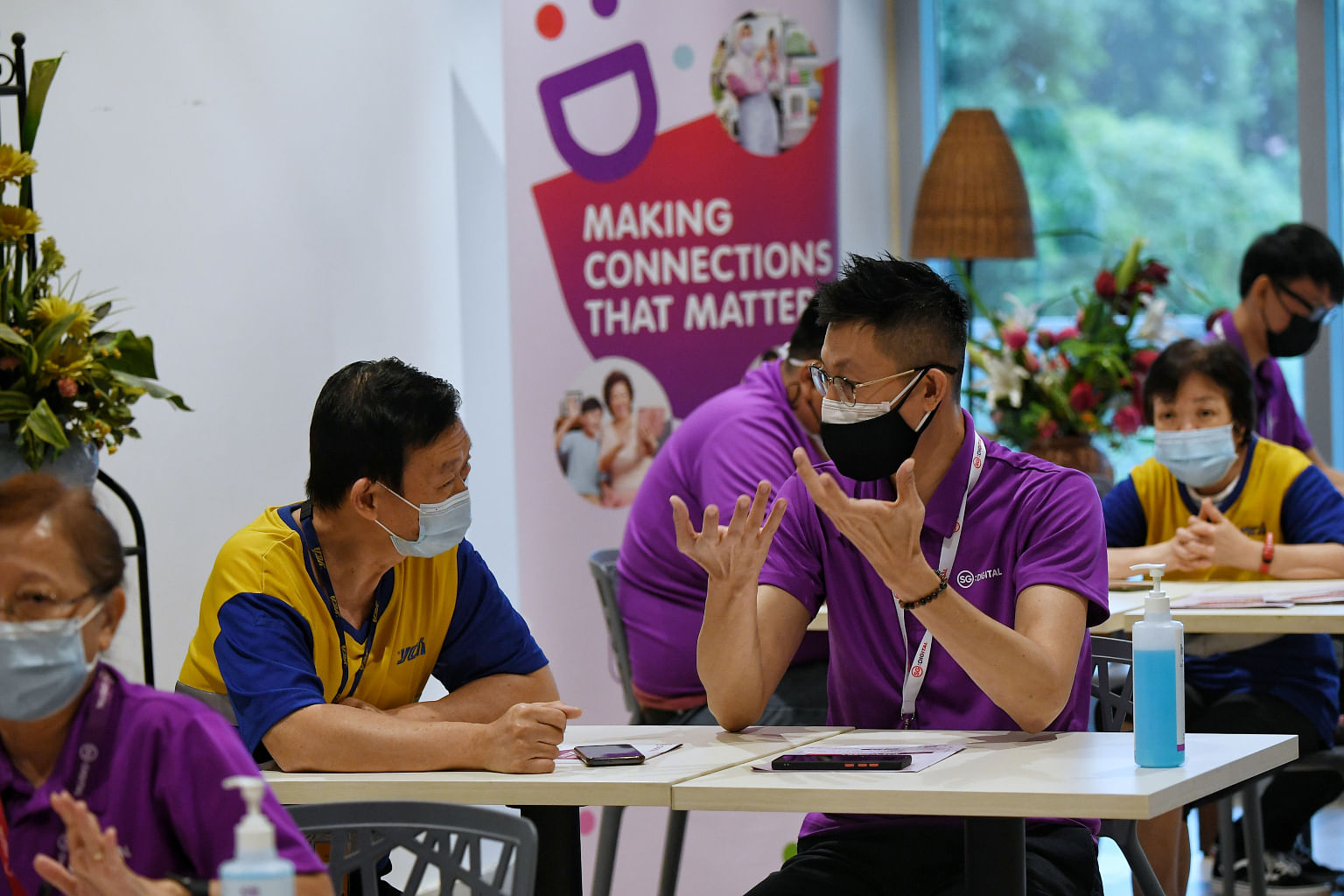$5 mobile plans for low-income seniors extended to 2 years
Sign up now: Get ST's newsletters delivered to your inbox

More than 7,900 seniors have benefited from IMDA’s Mobile Access for Seniors programme so far.
ST PHOTO: ONG WEE JIN
SINGAPORE - Affordable mobile phone plans for low-income senior citizens at $5 a month have been extended so that those who sign up can now enjoy them for two years instead of one.
The government-subsidised plans also give eligible seniors, who need financial assistance to get connected, at least 5GB of data monthly and a basic smartphone that starts from $20.
The extension is to enable more "lower-income seniors to enjoy affordable mobile access for a longer period so they can continue to learn new digital skills", the Infocomm Media Development Authority (IMDA) said on Friday (Sept 3).
It was one of several initiatives announced by Minister for Communications and Information Josephine Teo on Friday to encourage seniors to get connected online and pick up technology-related skills.
The $5 plans come under the Mobile Access for Seniors scheme. When they were first made available from the four telcos - Singtel, StarHub, M1 and TPG Telecom - in July last year, they lasted for only one year.
To qualify for the scheme, seniors must be, among other things, aged 60 or older, Singaporean, and receiving Comcare assistance or living in Housing Board Public Rental Scheme housing.
More than 10,000 people aged 60 and over were receiving Comcare assistance for their households as at March 31 last year.
So far, more than 7,900 seniors have benefited from IMDA's Mobile Access for Seniors programme.
Under the programme's mobile plans, should seniors exceed their data limits, there would be no excess data charges but surfing speeds would be throttled. Other perks include free SIM card registration and free caller ID.
Seniors who signed up for the mobile plans from June will enjoy them for two years. Those who signed up between July last year and May this year will automatically receive the one-year extension.
Mobile plans that come with a phone typically cost more than $5 a month, with cheaper ones ranging from $5 to $10 monthly, while the most expensive plans can cost over $100. Many lower-end budget smartphones tend to retail for under $200.
The improved mobile scheme complements other efforts by the SG Digital Office (SDO). IMDA set up the office in June last year as part of the Government's push to build a digitally inclusive society for Singapore.
Mrs Teo told reporters at a Jurong Spring Community Club event to mark SDO's one-year anniversary on Friday that the level of comfort and competency in using digital tools is not even across the whole population.
"There will be segments of our society who feel fearful about using digital technologies. Because of that, they feel inhibited about trying, and we're very concerned because we don't want people to be excluded from participating meaningfully in Singapore's digital future," she said.
So far, more than 100,000 seniors aged 60 and above have benefited from over 250,000 digital skills training sessions conducted by SDO. A survey found that nine in 10 of them will continue to apply at least one digital skill they have learnt in their daily lives.
The office has also engaged 18,000 stallholders from National Environment Agency hawker centres, HDB coffee shops and JTC industrial canteens in adopting digital tools such as the national unified e-payment solution, dubbed Singapore Quick Response Code (SGQR).

More than 60 per cent of them, or over 11,000 stallholders, have adopted SGQR, which involves using a mobile app to scan standardised QR codes to make cashless and contactless payments.
IMDA said that the number of stall transactions using SGQR from June last year to July this year was 1.8 million, compared with 270,000 over the same period the year before. The transaction value grew to $17.3 million, compared with $2.9 million a year ago.
Mrs Teo said that the proportion of customers of each hawker that uses SGQR varies from 10 per cent to as high as 60 per cent.
Mr Hau Peng Siang, 57, said that about 30 per cent of his customers use SGQR daily when making payments at his carrot cake stall in Jurong West. Most of these are young people.
He likes cashless e-payments for the fact that he does not have to make change for customers, which gives him more time to prepare food and sell more carrot cake.
"I don't have to handle cash so it's more hygienic," added Mr Hau in Mandarin.
Mrs Teo also announced more initiatives for seniors. One of them includes expanding the Seniors Go Digital programme that currently teaches seniors digital skills at close to 50 community hubs found in community centres and public libraries.
With the expansion, SDO will partner employers to bring the programme closer to seniors by holding the training at their workplaces.
Called SDO @ Workplace, the new initiative was successfully piloted with home-grown supply chain solutions company YCH Group at its Supply Chain City headquarters in the Jurong Innovation District.
Seniors employed by YCH can book an appointment at the training hub set up there, such as for a lunch-time slot, or anytime during their working hours with approval from their supervisors.
An SDO digital ambassador manning the hub will provide the training on a one-to-one basis and seniors can choose what skills they want to pick up. These include how to make a video call and using e-payment services. This is similar to the training at existing community hubs, so seniors can choose to continue learning at other hubs at their convenience.
Mr Juay Teck Seng, 60, an assistant supervisor at YCH who attended a session at his workplace on Monday, said he had known about the Seniors Go Digital programme previously, but found it hard to make time for it.
He said one of the most useful skills he picked up on Monday was how to make clinic appointments online using the Health Ministry's HealthHub app.

With an appointment, this cuts the waiting time to about half an hour, he said. Previously, he would register for consultations as a walk-in patient without making an appointment and would have to wait several hours to see a doctor.
"Next, I plan to learn about ordering groceries and online shopping. For those of us who are older, it's difficult to carry heavy things like rice and drinks," said Mr Juay, who lives with his wife. The couple have two adult children who live apart from them.
The training at the SDO @ Workplace hub at YCH can be customised to help seniors learn how to use apps needed for their work.
Mr Ryan Yap, 31, who is head of growth, innovation and partnership at YCH, said this could allow senior employees to have direct access to the company's human resource portal, for instance, so they can view their payslips or apply for leave on their own, instead of doing so through their managers.
He said: "If the seniors are keen, and adjustments to their shifts are needed so they can attend, we are more than happy to make them, because it will enrich their lives both in and out of the workplace."
The community hub at YCH will also be open to seniors employed by other tenants and users of the Jurong Innovation District too.
SDO is planning to roll out similar hubs at more workplaces progressively.
It is also setting up 200 roving community counters - such as at senior activity centres and the premises of residents' committees - to bring skills training nearer to more senior citizens.
The Seniors Go Digital programme will also be customised for seniors from specific segments of the community, such as those who are deaf or hard of hearing, to help them pick up digital skills.
SDO has partnered the Singapore Association for the Deaf (SADeaf) and Touch Silent Club to hold 80 one-on-one training sessions for such seniors.
Since March, 47 seniors have benefited, with SDO digital ambassadors using, among other things, sign language to help train them.
The office is working with community organisations and healthcare institutions to provide digital training to seniors who have special needs and medical conditions.
New topics have also been added to the Seniors Go Digital curriculum covering areas such as health, cyber security and lifestyle.
For example, seniors can be taught how to use health apps such as HealthHub and Healthy 365 to access their medical records and book clinic appointments.
They can also learn how to use e-commerce platforms like Shopee and recognise suspicious sellers and scammers.
For more information on the Mobile Access for Seniors scheme, visit the Seniors Go Digital website, e-mail info @ imda.gov.sg or call 6377-3800.


